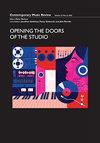The Piano in the Portuguese Experimental Music Scene: Approaches, Contexts, and Practices
IF 0.1
2区 艺术学
0 MUSIC
引用次数: 1
Abstract
ABSTRACT In Portugal, the avant-garde experimental approaches of the 1960s were fruitful for the emancipation of the sound potential of musical instruments and non-instruments. Since then, prepared techniques—the use of objects as sound producers, or in the context of extended techniques, electronics, and other processes of sound engagement—brought along the potential for rethinking and reformulating the piano and relationships between musical bodies. These prepared (extended) techniques were then acculturated, integrated, and somehow accommodated as a new normalisation, becoming in certain musical spheres the ‘new normal’. Connected to these approaches, new perspectives on experimentation with regard to the piano seem to be taking shape in Portugal, encompassing significant aesthetic, creative, and technical differences from the previous experimental vanguards. This study addresses the piano as a disruptive element in the current Portuguese experimental context, with regard to approaches, contexts, and practices. These disruptions are marked by an association with digital media resources, innovative performative perspectives, and the creation of different aesthetic outputs. However, this is an unconventional disruption—not a disruption related to the past, but an occasional disruption with the past. The objectives of the present study are to identify how the piano is treated by past experimentalists and as a contemporary technological artefact—including influences, techniques, languages, writing/recording materials, and the role of the performer—verifying the impact of its production, new conceptual transmutations, mapping composers and representative works, repertoires and formations, and the different roles assumed by the instrument.钢琴在葡萄牙实验音乐场景:方法,背景和实践
本文章由计算机程序翻译,如有差异,请以英文原文为准。
求助全文
约1分钟内获得全文
求助全文
来源期刊

Contemporary Music Review
MUSIC-
CiteScore
1.00
自引率
25.00%
发文量
48
期刊介绍:
Contemporary Music Review provides a forum for musicians and musicologists to discuss recent musical currents in both breadth and depth. The main concern of the journal is the critical study of music today in all its aspects—its techniques of performance and composition, texts and contexts, aesthetics, technologies, and relationships with other disciplines and currents of thought. The journal may also serve as a vehicle to communicate documentary materials, interviews, and other items of interest to contemporary music scholars. All articles are subjected to rigorous peer review before publication. Proposals for themed issues are welcomed.
 求助内容:
求助内容: 应助结果提醒方式:
应助结果提醒方式:


